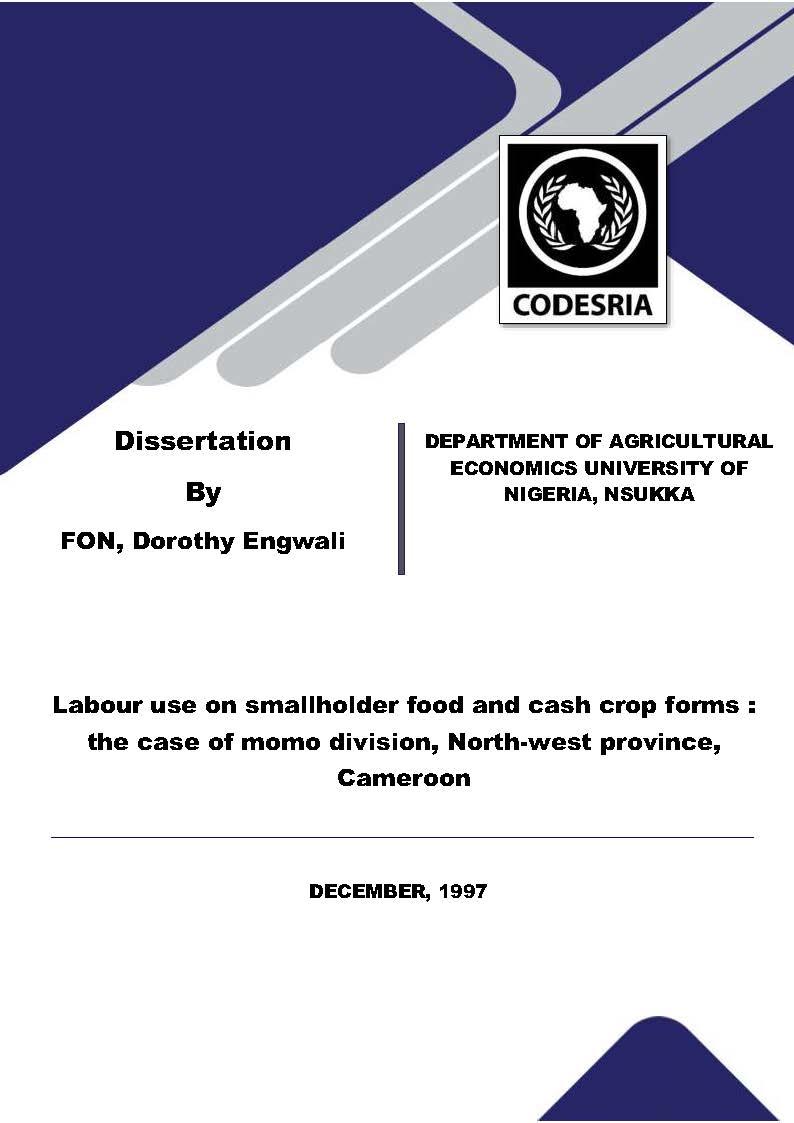Labour use on smallholder food and cash crop forms : the case of momo division, North-west province, Cameroon
Mots-clés :
smallholder, momo division, Cameroon, competitionSynopsis
This study investigated labour use on smallholder food (cocoyam) and cash (coffee) crop farms in Momo Division, North-West Province, Cameroon, mainly because of competition for available labour between them in the area.
Multi-stage ·random sampling technique was u ed to select six villages and 120 farmers. Pretested questionnaires were administered to these farmers. Descriptive statistics and production function model were used to analyse the data. Results showed that most of the farmers were above 40 years and 58.5 % had no formal education. Farm sizes ranged from l ss than a hectare to approximately four hectares for cocoyam and less than one hectare to seven hectares for coffee. Most (55.2), of the farmers have been farming for over 20 years. Land ownership was mostly
_through inheritance. The average number of farm'•fields was 3.4 for cocoyam and 1.6 for coffee. On the aggregate, family labour ranked first followed by exchange/communal labour and labour for the two crops. Women contributed most of the labour· (70.6%) in cocoyam production while men contributed most in coffee production (58.5%).
Weeding took 31.4% (highest) of the total labour required for cocoyam production, while harvesting took 52.9% (highest) for coffee production. Mixed cropping is the commonest cropping pattern.
Téléchargements
Références
Agueguia, A., S.Lyonga and J. A Whyte (1985), Root Crops Research in Cameroon,
CNRCIP 1984 Annual ~eport. Ibadan, Nigeria: IITA,
Akobundu, 1.0 (1981), "Weed Control in fylaize-Cassava intercrop" in Terry, E.R; K.A
Oduro and P. Caveness (eds), Tropical Root Crops: Research Strategies for the
s, Ottawa, Canada:IDRC. ,
Arene, 0.13. and E. U Okpala (1981), "A disease of cocoyam in Nigeria caused by
Corticium rolfsii" in Terry, E.R, K.A Oduro and F. Caveness (eds), Tropical
Root Crops: Research Strategies for the 1980s, Ottawa, Canada: IDRC.
Arrah, E.E (1992), "A comparative Analysis of Women, Group and Individual Farms in
Manyu Division". (M.Sc Project Report, Departriient of Agricultural Economics,
University of Nigeria, Nsukka, Nigeria).
Arze, J; C den Briggelaar; W. Brinkham; E. Frimpong; J. Kimenia, E. Lazaro and M.
Timmermans (1990), "Agricultural Research and Extension: A contribution to!
Understanding of the Linkages with small scale Farmers: A case study in
Kumba-corridor Agro-Ecological zone South West Province, Cameroon" ICRA
Teani Cameroon.
Atayi, E.A and H.C Knipscheer (1980), Survey of Food Crop Farming Systems in the
. ZAPI-EST East Cameroon, Cameroon: IITA/ONAREST.
Besong, M.T; S.W Almy and B. Bakia (1992), "Labour Management in Land
Preparation by Food Crop Farmers in South-West Province of Cameroon."
Journal of West African Farming Systems Research Network. Vol 2, No. 2.
Besong, M.T; S.W Almy and B. Bakia (1993), "The Land Productivity of the Small
Farm Holders in South-West Province of Cameroon". International Journal of
Tropical Agriculture, Vol 11, No 2.
Cambrony, 11.R (1992), The Tropical Agriculturist: Coffee Growing, London and
;. Basingstoke: Macmillan Press Ltd. '· ·,
Cameroon Ministry of Agriculture (1981), Annuaire de statistique Agricole 1980/81 En
Dirc_cLi_c~n_cl_cs eludes et projet. Yaounde, Cameroon: MINAGRIC






